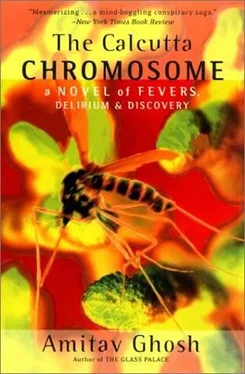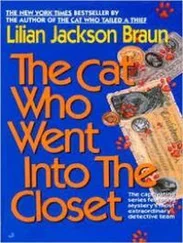At this a look of utter consternation descended on the assistant's hitherto smiling face. Farley saw him shooting a glance at the unnamed woman, who was watching them keenly from the other end of the laboratory. Then he launched upon a string of stammering protests: it was unnecessary to return the next day; there was nothing to be seen, it was just a pure waste of time, and anyway Cunningham-sahib would be away; better return later, some other day… in a fortnight, or a month hence, perhaps there would be something to see then…
The vehemence of his protests were such as to confirm Farley's suspicions: the man could not have indicated more clearly that he, and his silent companion across the room, were keen to rid themselves of him; that his presence the next day would disrupt some previously conceived connivance, some event or events that they had already planned, counting on Cunningham's absence.
Perceiving that he now held the advantage, Farley brushed past the pleading assistant, saying: 'Nevertheless I shall return tomorrow.'
With that he went to find Cunningham.
The Englishman was in the next room, seated on a chaise longue, puffing dreamily on a long-handled pipe. When Farley asked for his permission to continue the next day, he blew out a plume of sweet-smelling smoke and cried: 'Why, certainly, my boy! If you are determined to persist in your quest for this phantom of Laveran's, do come back, as often as you like. I'll tell them to expect you.'
On the point of taking his leave, Farley hesitated. He looked quickly about, to make sure that they were alone, and then, approaching the seated Englishman, he dropped to his knees.
'If I may enquire, sir,' he whispered in Cunningham's ear, 'under what circumstances did you admit this woman into your laboratory?'
'Mangala?' said Cunningham, pointing his pipe-stem over his shoulder.
'If that is her name, yes.'
'If you're asking me how I found her,' Cunningham said, 'the answer is I found her where I find all my bearers and assistants: at the new railway station – what do they call it? – oh yes, Sealdah.'
'At the railway station, sir?' gasped the astonished Farley. 'Exactly so,' said Cunningham. 'That's the place to go if you need a willing worker: always said so – it's full of people looking for a job and a roof over their heads. See for yourself the next time you're there.'
'But, sir,' Farley exclaimed, 'to take on untrained and uneducated… '
'And who better to train one's assistants than oneself, my boy?' Cunningham countered. 'Far preferable, in my opinion, to being surrounded by over-eager and half-formed college students. One is spared the task of imparting much that is useless and unnecessary.'
'So it was you who trained the woman – Mangala?' Farley asked.
'Indeed I did,' said Cunningham, staring hazily into the middle distance. 'And a quicker pair of hands and eyes I had never seen before. But… '
Pulling a long face, Cunningham tapped his head with a finger. 'But she's not all there, you see,' he said, 'her mind's been wasted – by disease, or licentiousness or who knows what?'
'And the young man?' Farley asked. 'What about him?'
'He's not been here long,' Cunningham said. 'Mangala brought him here: said he was from her own part of the country.'
'And where is that?'
'Not far from where you are,' Cunningham said. 'I believe the place is called Renupur – you may have passed it on your way here.'
'Why, yes,' said Farley. 'I passed through Renupur on my way to Calcutta.'
Farley was just about to ask the assistant's name when he heard a sound behind him. He rose and found himself looking directly at the woman, Mangala. She was glaring at him from across the room, and such was the anger in her gaze that it sent a chill down his back. As he made his way out, he noticed that she was conducting a whispered consultation with the young assistant.
Farley had barely reached the bamboo thicket in front of the laboratory when he heard footsteps racing behind him. Moments later the assistant caught up with him and asked in a voice of polite, almost beseeching enquiry, exactly when it was that he planned to come the next day. Determined to retain the advantage of surprise, Farley gave him a noncommittal reply: 'I shall come when I find myself within the vicinity. My arrival need not interrupt your work for the day.'
With that he turned his back on the crestfallen assistant and walked away.
Through much of the night, for no reason that he could adduce, Farley prayed. Yet he could find no name for what it was that faced him and why he feared it. And this in turn became his very fear, that he could not name what he knew he must confront. All next morning he stayed in his room, touching neither food nor water, and did not emerge from his cubicle until the hour was well past noon.
Thus, once again, it was late afternoon by the time he arrived at the Hospital. But today, unlike the day before, the sky was grey and overcast, and a strong wind was blowing across the Maidan. Approaching the laboratory, Farley had the feeling that the stands of bamboo that separated it from the hospital were alive, astir with movement. And when he stepped into the thicket he saw that there were indeed shadows ahead of him, on the path: three figures, cloaked and swathed, stumbling slowly towards the laboratory. Farley stopped, overcome with misgiving, and then, collecting himself he went forward again. When he was but a few yards behind the figures, he saw that the little group consisted of a man in a dhoti and a sari-clad woman. They were bearing between them another, almost inert, human figure. He approached them boldly, rattling his fob to make his presence known.' They stopped and turned to face him.
Farley's eyes went immediately to the figure in the middle. It was a man, possibly young, possibly in middle age, it was impossible to tell, for the hooded face was ravaged beyond description, the eyes turned upwards, showing only the whites, the skin mottled, flecked with scabs, the teeth in the open, drooling mouth sloping towards the throat as though knocked backwards. Farley's glimpse of him was brief, but his diagnostic sense, honed by months of practice in Barich, told him instantly that the man was in the last stages of syphilitic dementia.
Overcome with pity, Farley stretched out a helping hand towards the stricken man. But no sooner had the man's companions caught sight of him than they fled, melting away into the darkness. Farley stared after them and then headed down the path, to the laboratory.
When he was a few yards from the bungalow an unexpected sound came to his ears: a low chant, sung in unison by a number of voices. Slowing his pace, he listened carefully. It was soon evident that the source of the sound lay not in the bungalow but elsewhere. Looking carefully around, through the trees and bamboo thickets, Farley saw that a number of people had gathered around a low outhouse, a short distance away. They were squatting in a circle, around a fire, chanting to the accompaniment of hand-held brass cymbals, as though in preparation for a ritual or ceremony.
Curious now, he hurried towards the outhouse, but just then the main door of the laboratory flew open and the young assistant came running out. Under the guise of an effusive welcome, he ushered Farley quickly towards the laboratory.
Just as he was about to enter the laboratory, Farley noticed a great deal of activity in a nearby anteroom. The assistant tried to hurry him past but by dint of dragging his feet Farley managed to steal a quick glance into the room. The sight that met his eyes was so bewildering that he uttered no protest when his guide manoeuvred him through the laboratory door. What he saw was this: the woman Mangala was seated at the far end of the room, on a low divan, but alone and in an attitude of command, as though enthroned. By her side were several small bamboo cages, each containing a pigeon. Yet it was not the birds themselves, but rather the state they were in that amazed him. For they were slumped on the floors of their cages, shivering, evidently near death.
Читать дальше












